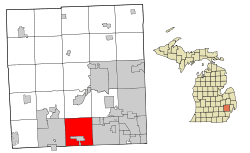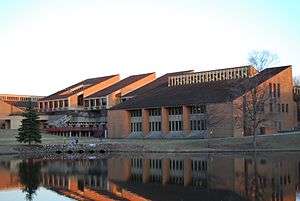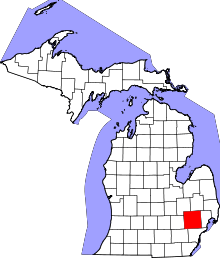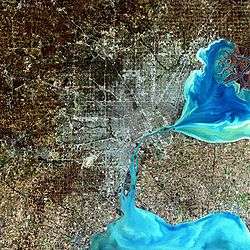Farmington Hills, Michigan
| Farmington Hills | |
|---|---|
| City | |
| City of Farmington Hills | |
|
Farmington Hills City Hall | |
 Location in the state of Michigan | |
 Farmington Hills Location in the United States | |
| Coordinates: 42°29′07″N 83°22′37″W / 42.48528°N 83.37694°WCoordinates: 42°29′07″N 83°22′37″W / 42.48528°N 83.37694°W | |
| Country | United States |
| State | Michigan |
| County | Oakland |
| Government | |
| • Type | Council-Manager |
| • Mayor | Ken Massey |
| • City Manager | Dave Boyer |
| Area[1] | |
| • City | 33.31 sq mi (86.27 km2) |
| • Land | 33.28 sq mi (86.19 km2) |
| • Water | 0.03 sq mi (0.08 km2) |
| Elevation | 860 ft (262 m) |
| Population (2010)[2] | |
| • City | 79,740 |
| • Estimate (2012[3]) | 80,756 |
| • Density | 2,396.0/sq mi (925.1/km2) |
| • Metro | 4,285,832 (US: 13th) |
| Time zone | EST (UTC-5) |
| • Summer (DST) | EDT (UTC-4) |
| ZIP codes | 48331-334-335-336 |
| Area code(s) | 248 |
| FIPS code | 26-27440 |
| GNIS feature ID | 1616988[4] |
| Website |
www |
Farmington Hills is the second largest city in Oakland County in the U.S. state of Michigan. Its population was 79,740 at the 2010 census.[5] It is part of the upscale northwestern suburbs of Metropolitan Detroit and is also around 20 miles (32 km) northeast of downtown Ann Arbor.
Farmington Hills consistently ranks as one of the safest cities in the United States, as well as in the state of Michigan. In 2010, the area ranked as the 30th safest city in America.[6][7] Farmington Hills also ranks as the 36th highest-income place in the United States with a population of 50,000 or more and ranks as 14th America's best cities to live by 24/7 Wall St.[8]
Although the two cities have separate services and addresses, Farmington and Farmington Hills are often thought of as the same community. Features of the community include a recently renovated downtown, boutiques, a vintage cinema, numerous restaurants, exotic car dealerships, art galleries, and public parks including Heritage Park. There are several historical sites including the Longacre House and the Governor Warner Mansion. Both cities are served by Farmington Public Schools. Farmington Hills serves as a major business center for the greater Detroit area.
Farmington Hills is the home of the Holocaust Memorial Center, the only Holocaust Memorial in the State of Michigan. The Center's mission is to educate the public about the tragedy and evils of the Holocaust. The Holocaust Memorial Center was originally located in neighboring West Bloomfield Township, but has since expanded and moved to its current facility.[9]
Geography
According to the United States Census Bureau, the city has a total area of 33.31 square miles (86.27 km2), of which 33.28 square miles (86.19 km2) is land and 0.03 square miles (0.08 km2) is water.[1]
History
The first white settler in what became Farmington Township was a Quaker from Farmington, New York, named Arthur Power. He purchased land in 1823 and returned in 1824 with a group of family and associates to clear the land. The settlement became known as Quakertown. A post office was established in January 1826 with the name of Farmington. The post office is still around today as a historical site. The township of Farmington was organized in 1827. The settlement incorporated as the village of Farmington in the winter of 1866-67. A fire on October 9, 1872, destroyed many buildings in the center of the village. Farmington incorporated as a city in 1926.
A small settlement also developed in Clarenceville, in the extreme southeast corner of the township on the boundary with Livonia in Wayne County. Stephen Jennings built a tavern and general store to accommodate travelers on the plank road between Detroit and Howell. The name remains in the Clarenceville School District. Even though the school buildings for Clarenceville are in Livonia in Wayne County, the school district serves a portion of Farmington Hills.
In 1847, a post office named North Farmington was established a mile south of the township line as Wolcott's Corners. After the death of postmaster Chauncey D. Walcott in 1865, the office moved to the township line in the northeast quarter of section 4 (near the intersection of 14 Mile Road and Farmington Road). The post office operated until September 1902.[10]
In 1839 a post office named East Farmington was established. It only lasted until 1842.[11]
Before the remainder of Farmington Township incorporated as the city of Farmington Hills, there were two other incorporated entities within the boundaries. The first began as a subdivision named Quaker Valley Farms that incorporated as the village of Quakertown in 1959. The other was Wood Creek Farms, developed in 1937 as a subdivision by George Wellington of Franklin, who named it after a New England estate. It incorporated as a village in 1957.[10] The villages together with the remainder of Farmington Township incorporated into the City of Farmington Hills in 1973.
In 1964 the city of Farmington started a tradition that became known as the Founders Festival. The festival is always held in mid-July each summer and is a fair gathering held in the downtown Farmington area. It's filled with arts and crafts, entertainment shows, good food, friends and family, and a fun atmosphere.
Economy
Gale, an educational publishing company owned by Cengage Learning, and the auto loan company TD Auto Finance are located in Farmington Hills.[12] There are also many branches of large corporations in the office campuses recently built.
The Nissan Technical Center North America (日産テクニカルセンター・ノースアメリカ) and Nissan Trading Corp. are located in Farmington Hills.[13] The Nissan technical center handled project engineering of vehicle bodies used in North America and Latin America. It also has a small laboratory; as of 2012 several PhD-credentialed scientists had been doing research on fuel cells, and the company planned to add electrical battery and recharging of electrical vehicle research to the technical center laboratory. As of January 2012 the technical center had 800 full-time employees. At that time Nissan planned to hire 150 more engineers in 2012 to work in the technical center.[14] The technical center opened in November 1991 and had a cost of $80 million.[15] In 2005 Nissan opened a $14 million design studio in Farmington Hills and the Nissan AZEAL was the first car to be designed there.[16]
Hitachi Automotive Systems Americas, Inc. (日立オートモティブシステムズアメリカズ、Inc.[17]) operates the Farmington Hills Office in Farmington Hills.[18] Hino Motors Manufacturing U.S.A., Inc. (日野モータース マニュファクチャリング U.S.A.株式会社[19]) has its headquarters in Farmington Hills.[20] The office is a sales and service office of Hino Motors, a truck subsidiary of Toyota. In 2005 Governor of Michigan Jennifer Granholm celebrated the office's opening.[21]
A business park in the 12 Mile and Halsted area houses offices of Panasonic, Greenpath, and Mercedes Benz. Panasonic moved into 90,000 square feet (8,400 m2) of leased space there in 2012, with plans to hire 60 full-time employees for a research and design center there. That space had been unoccupied for four years and was previously leased by Motorola.[22] Mango Languages, a language learning software company, is also headquartered here.
According to the City's 2013 Comprehensive Annual Financial Report,[23] the top employers in the city are:
| # | Employer | # of Employees |
|---|---|---|
| 1 | Botsford Hospital | 2,746 |
| 2 | Robert Bosch Corporation | 1,600 |
| 3 | Farmington Public Schools | 1,418 |
| 4 | Quicken Loans | 1,000 |
| 5 | Gale | 850 |
| 6 | Aditya Birla Minacs | 700 |
| 7 | Mercedes-Benz Financial Services | 600 |
| 8 | TRW Automotive Electronics | 600 |
| 9 | ACO Hardware (As of 2014 all ACO Hardware stores were absorbed by Ace Hardware and rebranded as Great Lakes Ace Hardware) | 500 |
| 10 | Nissan Technical Center North America | 500 |
Government
Farmington Hills utilizes the Council-Manager form of government, and thus is governed by a City Council consisting of a Mayor who can serve two 2-year terms (Dr. Ken Massey, elected in 2015) and six council members serving an unlimited number of 4-year terms (Dr. Randy Bruce, Richard Lerner, Michael Bridges, Valerie Knol, Samantha Steckloff elected in 2013 and Dr. Theresa Rich elected in 2015). The city council appoints a City Manager (currently: Dave Boyer), who manages the day-to-day operations of the city; a City Clerk who maintains all City Codes, Ordinances, Resolutions and other legal documents (currently Pam Smith); and a City Attorney who acts as legal advisor and representative for all City matters (currently Steve Joppich).
Farmington Hills is neighbor to Farmington. Together, the cities form a district represented in Michigan's State House District 37 by Democrat Christine Greig. Farmington Hills is part of State Senate District 14, represented by Democrat Vincent Gregory.
The Mayor's Youth Council is an active teen committee/council who work under the city to help address teen problems and issues. This council helped to build the Riley Skate Park (the largest skate park in the Midwest), and sends delegates to the National League of Cities (NLC) conferences, has articles published in the local newspaper, helps run city wide events, organizes battle of the bands, and hosts their own talk show. The Commission for Children, Youth and Families - operated in partnership with neighboring Farmington - is dedicated to creating a welcoming community for individuals of all ages and backgrounds. With a special emphasis on volunteerism, community service and education, the Commission partners with the Multi-Racial Multi-Cultural Commission (MRMC), the Commission on Aging, Farmington Public School District and the Farmington Public Library to inform residents on a variety of quality-of-life issues designed to promote wellness, access and knowledge.
In 2006, a public meeting was held in Farmington Hills to discuss the possible merger of the two cities as a money saving venture, and also as a way to keep the two communities vibrant. Farmington and Farmington Hills already share several services, such as a school district, a library system and a district court, however, both cities utilize their own fire departments, and Farmington has a public safety department rather than a police department.
Demographics
| Historical population | |||
|---|---|---|---|
| Census | Pop. | %± | |
| 1980 | 58,056 | — | |
| 1990 | 74,611 | 28.5% | |
| 2000 | 82,111 | 10.1% | |
| 2010 | 79,740 | −2.9% | |
| Est. 2015 | 81,330 | [24] | 2.0% |
| U.S. Decennial Census 2011 estimate | |||
According to a 2007 estimate, the median income for a household in the city was $73,274, and the median income for a family was $93,136. Males had a median income of $61,757 versus $39,540 for females. The per capita income for the city was $36,134. About 2.4% of families and 4.1% of the population were below the poverty line, including 3.2% of those under age 18 and 7.6% of those age 65 or over.
2010 census
As of the census[2] of 2010, there were 79,740 people, 33,559 households, and 21,412 families residing in the city. The population density was 2,396.0 inhabitants per square mile (925.1/km2). There were 36,178 housing units at an average density of 1,087.1 per square mile (419.7/km2). The racial makeup of the city was 69.7% White, 17.4% African American, 0.2% Native American, 10.1% Asian, 0.4% from other races, and 2.2% from two or more races. Hispanic or Latino of any race were 1.9% of the population.
There were 33,559 households of which 29.1% had children under the age of 18 living with them, 50.7% were married couples living together, 9.9% had a female householder with no husband present, 3.2% had a male householder with no wife present, and 36.2% were non-families. 31.5% of all households were made up of individuals and 12% had someone living alone who was 65 years of age or older. The average household size was 2.36 and the average family size was 3.00.
The median age in the city was 42.1 years. 21.5% of residents were under the age of 18; 7.1% were between the ages of 18 and 24; 25.2% were from 25 to 44; 30.2% were from 45 to 64; and 15.9% were 65 years of age or older. The gender makeup of the city was 47.1% male and 52.9% female.
In April 2013, Farmington Hills had the fourth largest Japanese national population in the state of Michigan, at 589.[25]
2000 census
As of the census[26] of 2000, there were 82,111 people, 33,559 households, and 21,813 families residing in the city. The population density was 2,466.4 per square mile (952.3/km²). There were 34,858 housing units at an average density of 1,047.0 per square mile (404.3/km²). The racial makeup of the city was 82.95% White, 6.94% African American, 0.17% Native American, 7.54% Asian, 0.02% Pacific Islander, 0.46% from other races, and 1.93% from two or more races. Hispanic or Latino of any race were 1.47% of the population. 12.6% were of German, 9.1% Polish, 8.3% Irish, 7.1% English and 5.5% Italian ancestry according to Census 2000.
There were 33,559 households out of which 29.5% had children under the age of 18 living with them, 56.0% were married couples living together, 6.6% had a female householder with no husband present, and 35.0% were non-families. 29.6% of all households were made up of individuals and 10.2% had someone living alone who was 65 years of age or older. The average household size was 2.41 and the average family size was 3.04.
In the city the population was spread out with 23.1% under the age of 18, 6.7% from 18 to 24, 31.3% from 25 to 44, 24.6% from 45 to 64, and 14.4% who were 65 years of age or older. The median age was 39 years. For every 100 females there were 93.8 males. For every 100 females age 18 and over, there were 90.2 males.
Education

Most of Farmington Hills is served by Farmington Public Schools, which is shared with nearby Farmington. It is home to North Farmington High School and Harrison High School, while Farmington High School in Farmington serves portions of Farmington Hills. Harrison High School's football team, the Hawks, are known for excelling at football[27] led by Coach John Herrington who has been the coach since the opening of the school in 1970. In addition, the alternative school Farmington Central High School is in Farmington Hills.
Farmington Hills also encompasses parts of the Clarenceville School District, and the Walled Lake Consolidated School District.
The city includes several private schools, including two parochial Catholic schools, Our Lady of Sorrows and St. Fabian, run by the Archdiocese of Detroit, an all-girls Catholic high school, Mercy High School, one Lutheran school, Concordia Lutheran School/St. Paul's Lutheran Preschool, and a non-denominational Jewish day school, Hillel Day School.
Farmington Hills is also home to multiple elementary schools, and middle schools. The elementary schools consist of grades Kindergarten through 5th and the middle schools take grades 6 through 8. The elementary schools include Beechview Elementary School, Forest Elementary School, Gill Elementary School, Highmeadow Common Campus, Hillside Elementary School, Kenbrook Elementary School, Lanigan Elementary School, Longacre Elementary School, and Wood Creek Elementary School. The three middle schools are East Middle School, Power Middle School and Warner Middle School. O.E. middle school was closed in the spring of 2016 with a view to being relaunched as a K-8 STEAM (Science Technology Engineering Arts Mathematics) school.
The city also contains branches of Oakland Community College and Wayne State University, and is the home of the Michigan School of Professional Psychology.
Transportation
Suburban Mobility Authority for Regional Transportation (SMART) operates local and regional bus transit.
The major thoroughfares in the city are Grand River (M-5), Orchard Lake Road, 12 Mile Road, 8 Mile Road, Northwestern Highway, I-696 and I-275. The city contains several freeway interchanges connecting local roads to the two interstates.
Facilities
Hunters Square (formerly the Tally Hall food court) is a Shopping Centre on Orchard Lake Rd.
Notable people
Notable current and former residents include:
- Elizabeth Berkley, actress
- Manoj Bhargava, founder and CEO, 5-hour Energy
- Danny Brown, hip-hop artist
- Pam Dawber, actress
- Colin Egglesfield, actor
- Cam Fowler, NHL hockey player for the Anaheim Ducks
- Devin Funchess, wide receiver for NFL's Carolina Panthers
- Tatiana Gutsu, two-time Olympic champion gymnast[28]
- Kirsten Haglund, winner of Miss Michigan (2007) and Miss America (2008)
- Arthur Hanlon, Latin musician
- Jena Irene, American Idol Season 13 runner-up
- Al Jean, writer/producer
- Jody Lockman, inventor of the cornflake shake
- Bill Joy, co-founder of Sun Microsystems
- Meg Mallon, professional golfer
- Jaime Ray Newman, actress
- Eren Ozker, puppeteer, Muppeteer
- Neal Rubin, columnist (The Detroit News)
- Barry Sanders, Hall of Fame running back for the Detroit Lions
- Martha Smith, model and actress, Miss July 1973 Playboy centerfold
- Drew Stanton, quarterback for Michigan State and NFL's Arizona Cardinals
- Fred Toucher, Boston radio DJ for 98.5 The Sports Hub
- James Wolk, actor
See also
References
- 1 2 "US Gazetteer files 2010". United States Census Bureau. Retrieved 2012-11-25.
- 1 2 "American FactFinder". United States Census Bureau. Retrieved 2012-11-25.
- ↑ "Population Estimates". United States Census Bureau. Retrieved 2013-06-03.
- ↑ U.S. Geological Survey Geographic Names Information System: Farmington Hills, Michigan
- ↑ "Race, Hispanic or Latino, Age, and Housing Occupancy: 2010 Census Redistricting Data (Public Law 94-171) Summary File (QT-PL), Farmington Hills city, Michigan". U.S. Census Bureau, American FactFinder 2. Retrieved August 18, 2011.
- ↑ Profile, muniweb.fhgov.com; accessed June 26, 2015.
- ↑ Ashford, Kate; Bartz, Andrea; Cox, Jeff; Fitch, Asa; Gandel, Stephen; Hyatt, Josh; Kelley, Rob; Knight, Kathleen; et al. "55. Farmington, Mich". CNN.
- ↑ "America's 50 Best Cities to Live". 247wallst.com. Retrieved 2016-01-06.
- ↑ Farmington Hills Holocaust Memorial Center website, holocaustcenter.org; accessed June 26, 2015.
- 1 2 Romig, Walter (1986) [1973]. Michigan Place Names. Detroit, Michigan: Wayne State University Press. ISBN 0-8143-1838-X.
- ↑ Romig, Michigan Place Names, p. 169
- ↑ "Gale". Retrieved January 8, 2010.
- ↑ "Nissan in North America." Nissan. Retrieved on November 6, 2012. "Nissan Technical Center North America 39001 Sunrise Drive P.O. Box 9200 Farmington Hills, MI 48333-9200" and "Nissan Trading Corp., U.S.A. 38505 Country Club Drive, Suite 200 Farmington Hills, MI 48331"
- ↑ Szczesny, Joseph. "Nissan to hire 150 engineers in Farmington Hills." The Oakland Press. Tuesday January 10, 2012. Retrieved on November 20, 2012.
- ↑ Cohen, Sharon. "Metamorphosis in Motown." Associated Press at The Ledger. Thursday December 26, 1991. p. 7C. Retrieved from Google News (95 of 121) on November 19, 2013.
- ↑ "Michigan studio to drive new Nissan look." The Detroit News. March 18, 2005. Retrieved on November 6, 2013. ID: det21098142. "The Azeal was the first model designed at Nissan's Farmington Hills studio,[...]"
- ↑ "2000~2013." (Archive) Hitachi Automotive. Retrieved on September 30, 2013.
- ↑ "Contact Us." Hitachi Automotive Systems Americas, Inc. Retrieved on September 30, 2013. "Farmington Hills Office 34500 Grand River Avenue Farmington Hills, MI 48335"
- ↑ "企業情報." (Archive) Hino Motors. Retrieved on September 30, 2013.
- ↑ "Contact Us." Hino Motors Manufacturing U.S.A., Inc.. Retrieved on November 6, 2012. "37777 Interchange Drive Farmington Hills, MI 48335"
- ↑ "Gov. Granholm courts Japanese truckmaker." The Detroit News. July 24, 2005. Retrieved on November 6, 2013. ID: det21954883.
- ↑ "Panasonic sets up R&D center - and 60 jobs - in Farmington Hills." Metro D Media. Issue Media Group, LLC. Thursday April 19, 2012. Retrieved on November 6, 2013.
- ↑ City of Farmington Hills CAFR
- ↑ "Annual Estimates of the Resident Population for Incorporated Places: April 1, 2010 to July 1, 2015". Retrieved July 2, 2016.
- ↑ Stone, Cal. "State's Japanese employees increasing." (Archive) Observer & Eccentric. Gannett Company. April 11, 2013. Retrieved on May 5, 2013.
- ↑ "American FactFinder". United States Census Bureau. Retrieved 2008-01-31.
- ↑ "Harrison Hawk Football History" (PDF). Archived from the original (PDF) on October 29, 2008. Retrieved 2008-05-03.
- ↑ Pierre, Meaghan St (11 August 2016). "Olympic gymnast opens studio, dreams of winning gold again as coach". WDIV. Retrieved 2 December 2016.
Sources
- Wilkins, Korie (2006-12-19). "Merging Cities Debated". The Detroit Free Press. Retrieved 2006-12-19.
External links
| Wikimedia Commons has media related to Farmington Hills, Michigan. |
- City of Farmington Hills official website
- Farmington/Farmington Hills Public Schools
- Farmington/Farmington Hills Public Library
- Mayor's Youth Council
- Pictures around Farmington Hills
- Oakland County, Michigan

